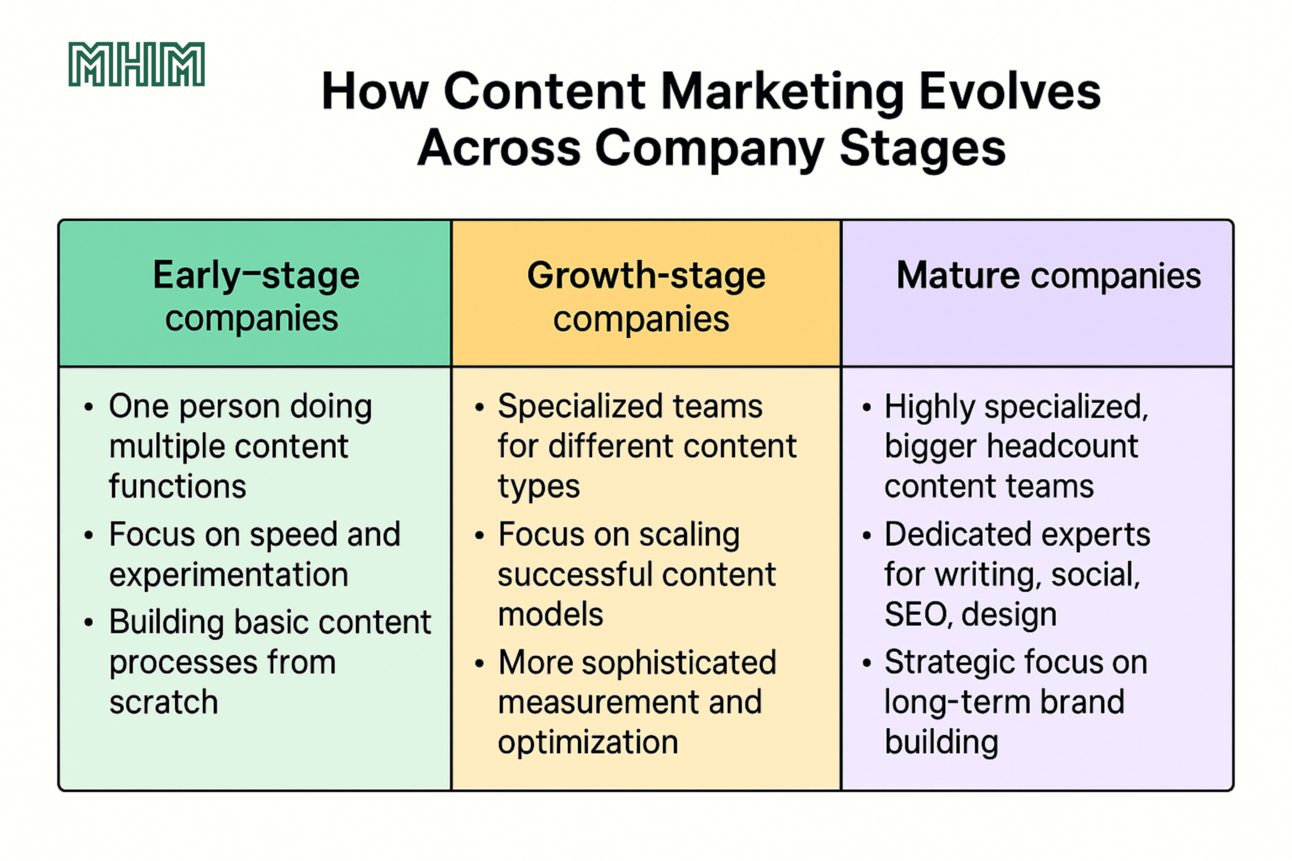- Marketers Help Marketers Newsletter
- Posts
- 🧪 Career reflections of a content marketing leader
🧪 Career reflections of a content marketing leader
Marketers Help Marketers

Hello hello 👋🏽,
Welcome to the 13th edition of Marketers Help Marketers newsletter.
This is a special edition for two reasons.
Last week marked exactly one year since the Marketers Help Marketers podcast launched.
One year of sharing career stories, insights, and lessons from marketing leaders.
One year of building this incredible community of marketers helping marketers.
And I couldn't think of a better way to celebrate than with today's edition.
Today's edition features Disha Parekh – Head of Content at PriceLabs and the very first specialist on the show.
While this wasn't deliberate, I've ended up interviewing mostly marketing generalists so far.
This edition breaks that pattern.
Disha’s approach to career building is remarkably thoughtful and strategic.
I believe this episode will resonate deeply with both content marketers and marketers in general.
Table of Contents

Disha is the kind of marketer who proves that knowing what you don't want is just as powerful as knowing what you do want.
She leads the content team at PriceLabs and has over 15 years of experience as a content marketing specialist, having spent time at both agency and brand side.
Each role was built strategically on the previous one, taking her across diverse industries – from travel tech to HR tech to vacation rental technology – while deepening her content expertise.
Fun fact: While transitioning from the agency side to the brand side, she landed her breakthrough role at Paytm after tweeting to ask for open roles.

During our conversation, Disha shared insights from her 15 years of intentional career building.
Here are the biggest lessons that can transform how you think about your own career trajectory.
Two powerful career strategies: Plan short-term and know what you don't want
Most career advice pushes long-term vision, but Disha advocates a different approach entirely.
"Planning short-term is more realistic because there's a locus of control."
She focuses on 1-2 year plans, understanding that countless variables – including personal life, the economy, and industry changes – remain outside of your control.
Short-term planning allows you to make concrete progress while adapting to changing circumstances.
Equally powerful is her second strategy: clarity about what you don't want.
Early in her career, Disha realized agency life wasn't sustainable long-term. This self-awareness guided her transition to brand-side roles where she could thrive.
Both strategies work well together:
Shorter planning horizons give you flexibility, while knowing your dislikes provides clear boundaries for decision-making.
Communication vs. comprehension: the foundational skills most marketers miss
Communication and comprehension are two different skills that both need mastering.
Disha takes this as an important lesson from her time at agencies:
"The brief would be what we would expect the client to fill. The comprehension would be what we would comprehend and then give as an output."
When comprehension fails, the cost is real: "If I have not comprehended the expectation, I'm going through multiple rounds of reviews, multiple changes, which is effectively not a good use of anyone's time."
Her agency experience was intense – handling multiple clients simultaneously. "If the comprehension did not exist for us, that would lead everyone to work on something at least thrice."
The solution came through rigorous documentation:
"We had a team lead that would make us spend time writing detailed meeting minutes. At that point, it felt like a nightmare. Later, I realized how important it was to document each word spoken."
This discipline taught her that "attention to detail goes hand in hand with communication and comprehension."
Specialist vs. generalist
Should you specialize in something in marketing or become a marketing generalist?
Early career folks always wonder about this, and here’s what Disha had to say.
She chose specialization because she wanted to become a deep expert in content marketing rather than spreading herself across all marketing disciplines.
If I can do this much for these many brands and still do a decent job, imagine how much I can do focusing on one domain.
"Sticking to content marketing helped me have conversations where I'm confident. Pushbacks became easier."
The key insight: Specialization isn't limiting if you choose the right specialty and continue evolving within it.
How content marketing evolves as per company stage (and why most companies get it wrong)
Most companies make the same critical mistake with content marketing.
Too many companies hire one junior writer and call it "marketing."
Disha says, "Marketing should be thought of as foundational, just as important as product and engineering."

Her advice: Don't wait until you're scaled to build marketing properly. Invest in senior talent early who can grow the function alongside your product.
The wrong approach: Treating content as an afterthought once product-market fit is achieved.
The right approach: Building marketing functions alongside product development from day one.
This approach sets the foundation for sustainable, strategic growth rather than reactive content creation.
The difference between companies that get this right versus wrong often determines whether content becomes a growth driver or just another expense line item.
The strategic power of industry switching
While conventional wisdom says "pick an industry and go deep," Disha deliberately moved across different sectors throughout her career.
"I feel that if I had stuck to the same domain or similar domains, I would have had slower growth."
She worked across publishing → travel tech → HR tech → communication platforms → vacation rental tech.
Each switch was well thought out and not random.
"Gathering this experience while not changing the underlying pace of content marketing has helped overcome some challenges a lot easier."
More importantly, Disha only moved when it made sense.
"Wherever organizations have invested in me, I have stayed back."
This is not about chasing shiny objects, but about deliberately building a diverse skill set while maintaining her specialization in content marketing.
Managing founder expectations: The education game
Every content marketer faces this challenge: working with founders/leadership who don't get marketing.
Content is assumed as something everyone can do. But if everyone could do it, everyone's LinkedIn posts would be getting the same amount of engagement.
To solve for this challenge, she suggests:
Proactively explaining what pieces they might be missing
Showing how content connects to business goals they care about
Setting realistic expectations about what content can and cannot achieve
"If you know what your next one to two years are going to look like, organizationally, we can be in tandem with what you want to work towards."
There’s also a key realization at play here: "If self-awareness (founder’s) is missing, then no amount of conversations will be helpful."
This helped her choose organizations where she could actually succeed rather than constantly fighting uphill battles.
Transitioning from IC to managerial roles
The key to moving into management isn't waiting for the promotion – it's changing how you think about work.
"It's important to think about yourself as a manager. If you bring that mindset shift, your conversations will automatically change."
The fundamental difference:
When you're working as an IC, you're only looking at one problem statement at an execution level. But when you are thinking about managing... you're taking on more than what you are asked to.
This means starting more conversations with different teams and being genuinely curious about how things work.
Her practical advice: "Going up to someone's desk and asking them, 'Can you tell me how this works?'"
Figure out what your next title should be. Look at what that job description involves. Whatever is missing from your role right now – that's what you work towards.
This way you're already demonstrating management capabilities before getting the title.
In conclusion
After spending hours with Disha, one thing became crystal clear:
Intentionality separates good careers from great ones.
She thought deeply about each move.
Most importantly, she stayed true to her strengths while remaining open to growth.
As we wrap up year 1 of the Marketers Help Marketers podcast, Disha's story feels like the perfect celebration.
She embodies everything this community represents: marketers helping marketers through thoughtful career choices.
Listen to the full episode with Disha wherever you get your podcasts. Trust me, the entire conversation is worth your time.

Next week, I'm bringing you the second part of our conversation with Disha – this time focused on the practical stuff.
We'll cover red flags in job descriptions that scream "run away," how to choose the right industries as a content marketer, and specific strategies for freelancers wanting to land strategic projects or transition in-house.
If you've ever wondered what hiring managers actually look for, you won't want to miss it.
But for now, I want to hear from you.
Which of Disha's insights resonated most? What career lesson will you apply immediately?
Reply and let me know. I read every single response.
This first anniversary feels surreal.
Thank you for being part of this journey and for all the conversations, feedback, and support. 🫶🏽
Here's to many more years of marketers helping marketers! 🎉
Your marketer friend,
Mita ✌🏽
